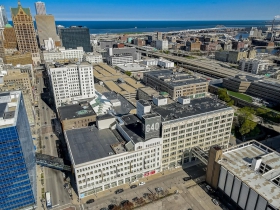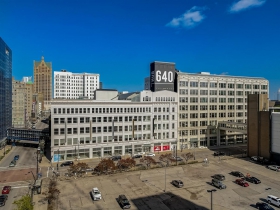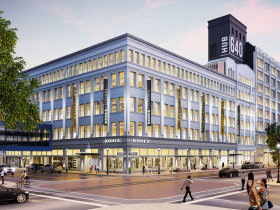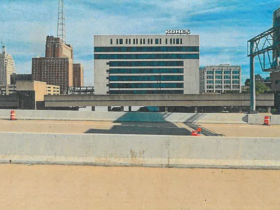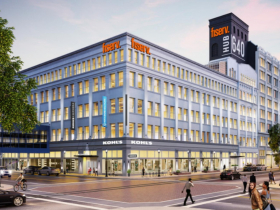Unusual Sign Will Resolve Kohl’s-Fiserv Conflict
Companies want to write their names in the sky. Plus: Recap of week's real estate news.
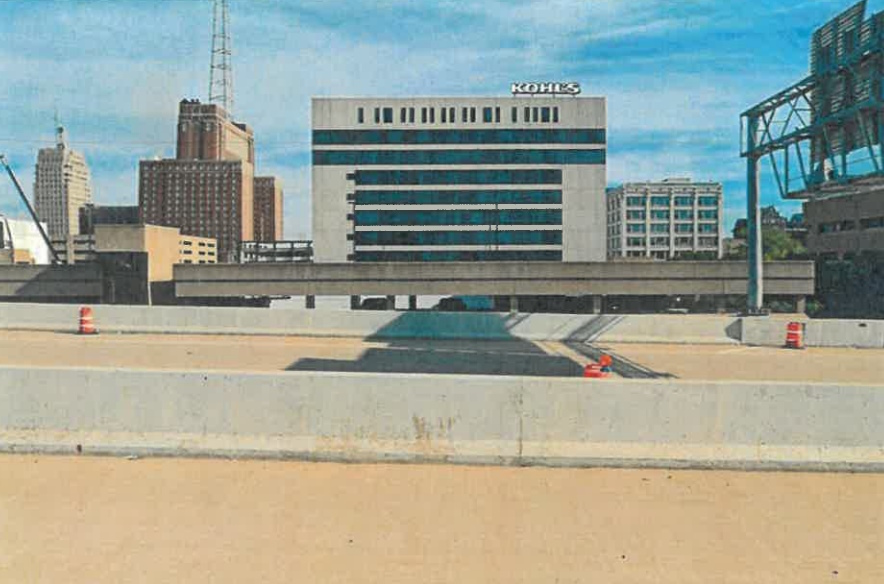
Kohl’s sign atop The Buckler. HUB640, site of Kohl’s and Fiserv, is located to the right. Image submitted to the city by North Wells Capital.
A new building permit filed with the Department of Neighborhood Services reveals how a downtown property owner is resolving one of the stranger real estate conflicts in recent Milwaukee history.
After scoring a major win for itself and the city by landing both a 40,000-square-foot Kohl’s department store and Fiserv’s corporate headquarters within a couple months of one another, North Wells Capital ended up with a problem on its hands: both tenants wanted rooftop signage atop the HUB640 building they were to occupy.
When the Kohl’s deal was announced in July 2022, renderings depicted Kohl’s signage on several levels of the former Boston Store complex, 640 N. Vel R. Phillips Ave., including a large sign atop the south side of the building where Kohl’s wasn’t to have a presence. The new department store, since opened, occupies the northern end of the first floor. Then, in October, it was announced that Fiserv would relocate to the upper floors of the building and construct a special entrance on the south side, toward which its approximately 144,000 square feet of office space would be oriented. A rendering released shortly after the announcement showed Fiserv signage on several spots, including atop the stair column in the center of the eight-story building.
To resolve the conflict, Chicago-based North Wells is now proposing to quickly install the rooftop Kohl’s sign atop the neighboring The Buckler apartment building, located a block southwest at 401 W. Michigan St. The sign, 40 feet in width with six-foot-tall letters, would face south from the 11-story building. The individual letters, which would face Interstate 794 and also be visible by northbound drivers on Interstate 43/94, would each be illuminated.
It’s possible it might have been cheaper for North Wells to lease a series of apartments and place the letters in the floor-to-ceiling apartment windows. A lease agreement submitted with the permit requests shows that North Wells will pay a starting fee of $42,000 per year, which will grow to $50,193 by the end of the initial 10-year window. A series of lease extensions would drive the price even higher. The sign itself would be fabricated by Legacy Sign Group and, according to the permit, represents a $130,000 property investment.
But it’s not too high of a price to pay when you now have two marquee tenants and could otherwise lose them. North Wells, through no fault of its own, has been there before. Bon-Ton filed for bankruptcy and was liquidated a year after North Wells bought the building in what was supposed to be a leaseback agreement. The company’s permit request suggests North Wells doesn’t want to see that happen again.
“Because of the intertwined nature of these concessions and negotiations, should we run into an unforeseen circumstance where the sign is not allowed to be installed, there is a risk that both Kohl’s and Fiserv would enforce [lease] provisions allowing both tenants to vacate the downtown market,” says the application, which requests the city expedite the request and skip a Board of Zoning Appeals approval process that would stretch into April.
Permit records indicate the city endorsed the expedited request in the days following the Feb. 1 filing. In fact, North Wells credits the city for creating the concept for the solution. “The undertaking of the installation of the Kohl’s sign at the Buckler is the aggregation of a multi-pronged negotiation involving Kohl’s, Fiserv, the City of Milwaukee, and North Wells Capital,” wrote North Wells in the application. “At the direction of municipality personnel, in an effort to accommodate both Kohl’s and Fiserv, HUB640 was instructed to seek alternate locations for the Kohl’s building sign, with the Buckler being adjacent and the most logical solution.”
The Kohl’s store opened in November. On Jan. 9, Fiserv applied to open much of its space to employees. The financial service company, as part of a city and state subsidy agreement, is expected to expend at least $37 million on its space buildout. North Wells also purchased a 712-space parking structure, 615 N. Vel R. Phillips Ave., to accommodate the arrival of at least 780 Fiserv employees
The new signs join a growing trend of marketing towards Interstate 794, even as the elevated freeway could be demolished. Milwaukee Tool‘s downtown office was codenamed “Red Beacon” during the development process, and, true to the name, a multi-story red wall and Milwaukee Tool logo were installed facing the freeway as part of the development. Regal Rexnord has its sign affixed atop its newly-designated corporate headquarters. Husch Blackwell and Old National Bank have added freeway-facing signage to the Huron Building and Central Standard Craft Distillery has freeway-focused signage on its Crafthouse & Kitchen complex. Several smaller signs also dot the almost one-mile stretch. And while the “red beacon” certainly stands out at night, the Milwaukee Public Market‘s sign remains the most recognizable sign in the corridor.
U.S. Bank Center, ASQ Center Also Getting New Signs
The U.S. Bank Center will soon join HUB640 in receiving new signage. As part of a five-year lease extension announced last summer, Baird negotiated to have its name affixed to two of the four sides of the 42-story tower, the state’s tallest.
Those signs were installed last fall. But now, U.S. Bank will also replace its signs at a cost of $400,000. The 75-foot-wide by 20-foot-tall signs will adorn the east and west sides of the building. The design will revert to an earlier iteration, with a white background and colored blue letters. The current iteration, in place for approximately a decade, features white letters atop a blue background. The white background will contrast with the even larger Baird signs, which have a blue background and white letters.
Veolia North America, which relocated its offices and 150 employees to the ASQ Center last fall, will also receive an $85,000 rooftop sign on the nine-story building. The sign, according to a permit request, will face west toward HUB640 from the former Gimbel’s complex, 101 W. Wisconsin Ave.
Perhaps not coincidentally, the projects appear to all be timed to be completed in time for the July Republican National Convention when tens of thousands of visitors and international media coverage are expected to put Milwaukee in the spotlight.
Weekly Recap
Board Funds Crisis Housing in Uptown Neighborhood, Demurs On Southside Dog Park
A unique approach to affordable housing will receive $1 million in funding from Milwaukee County following the board’s approval.
KG Development, led by Anthony Kazee and Jamie Gray, are planning to redevelop a former Jewish Home in the Uptown neighborhood into affordable housing and crisis beds. The project will be the first of its kind in Wisconsin, according to James Mathy, Housing Division Administrator.
The plan is to turn the three-story building at 2436 N. 50th St. into 41 units of affordable housing, with 20 of them being crisis units. The 20 set-aside units would be used for people experiencing a housing crisis because of eviction or domestic violence.
The board voted unanimously in favor of granting the funding to the project.
Eitel Cancels Plans For Vel Phillips Plaza Cafe After Council Questions, Public Opposition
Egg was supposed to be on the menu, not the landlord’s face, at Mike Eitel‘s cafe at Vel R. Phillips Plaza.
The deal to develop the cafe is now dead and no one appears happy, or willing, to talk about why.
Mayor Cavalier Johnson‘s administration announced the proposed cafe to great fanfare in early January. Eitel, owner of Caravan Hospitality Group, would lease the new cafe building across from the Baird Center and anchor the plaza with a cafe that would serve food and drinks all day long. An early morning coffee bar was to transition to a great place to grab a lunch and ultimately a fun place for a happy hour.
The city appeared to have found a winner for its signature $17 million plaza. Eitel operates the Nomad World Pub, SportClub, Barrel Burrito Company and the newly-opened Experts Only bar.
Developers Donate Third Ward Building To Preservation Alliance
A partnership of two development firms that sought to demolish a fire-damaged Historic Third Ward tavern donated the property to the Milwaukee Preservation Alliance (MPA).
General Capital Group and Joseph Property Development transferred the building to the 501(c)(3) nonprofit Wednesday, the preservation group announced.
Last year the developers argued that the vacant tavern at 266-272 E. Erie St. was beyond practical repair and sought to demolish the structure. But the Historic Preservation Commission denied the request and the partners didn’t pursue an appeal to the Common Council.
“We could not be more thrilled with General Capital Group and Joseph Property Development’s willingness to work with us throughout the donation process, and their commitment to preservation and transparency,” said MPA Executive Director Emma Rudd in a statement. “As many know, the tavern’s current condition is challenging. This is mainly due to a fire that occurred prior to General Capital Group and Joseph Property Development’s ownership. But MPA’s Board of Directors said it best: ‘if we can’t save this building, then who can?’ This tavern has an incredibly rich 140-year history, and restoring it aligns directly with the core of MPA’s mission: protecting our city’s built heritage. I cannot think of a more deserving project to take on.”
Food Hall Would Save Historic Tavern
Years after it was first proposed, a proposal to rehabilitate a 134-year-old Schlitz tied-house tavern and develop a food hall at the corner of N. Humboldt and E. North avenues is moving forward.
Developer Clarence Morse was recommended for approval Tuesday to purchase the former Humboldt Gardens building, 2249 N. Humboldt Ave., for $1.
The low price reflects the high difficulty of what Morse is attempting to do.
A six-stall food cart court would be constructed behind the building, while the first floor of the three-story building would be redeveloped as a bar and indoor seating space. The upper floors would become office space. The basement would house a commercial kitchen.
City Won’t Fully Regulate Airbnb In Milwaukee
After a six-month review, members of Mayor Cavalier Johnson‘s administration aren’t recommending the city explore further regulating Airbnb or other short-term rental (STR) providers.
And not because state law prevents it, but because the administrative burden would likely exceed the public benefit and any increase in revenue.
“It would be, at best, a break-even result,” said Department of Neighborhood Services (DNS) Commissioner Jezamil Arroyo-Vega. And she said it could take several years to get to that point. “The group is not recommending additional STR regulations at this time.”
“It would require enough staff to inspect all of the units,” said Department of City Development planning manager Sam Leichtling, summarizing the key issue. DNS is already short staffed, which has resulted in delays in a push to improve conditions with Housing Authority of the City of Milwaukee properties.
Warehouse Art Museum Is Moving
The Warehouse Art Museum is moving.
The new location for the private art museum, though, is being kept under wraps. Since 2018 the museum has been located at 1635 W. St. Paul Ave.
The museum was founded by the visual artist Jan Serr and her husband John Shannon, who serves as the museum’s managing director. It is located in the same building where Guardian Fine Art Services is located, founded by Shannon and offering secure storage, transportation, crating, and other services for art works and collections of all kinds. Guardian will continue in the historic building in the Menomonee River Valley, which was redeveloped to accommodate the business, which opened in 2017.
The museum temporarily closed at the end of 2023 and will not reopen until 2025, when it’s expected to be in its new digs. Though, it is planning “several events” in 2024.
County Announces Home Repair Program for Seniors
Seniors in the city of Milwaukee will soon have access to a public fund for home repairs and improvements.
County Executive David Crowley announced Monday that the county’s Department of Health and Human Services (DHHS) is rolling out a home repair program for seniors and residents with disabilities. The program will cover home repairs and installation of specialty home modifications.
The 2024 budget included $1 million for the senior home repair program. DHHS will hold two public workshops at senior centers in February to begin training county residents on how to access the new program.
“This new program will provide support to older adults and ensure they are able to easily navigate their homes, remain safe, and age in place,” Crowley said in a statement. “With our older adult population continuing to grow, Milwaukee County is providing more tools to fulfill the desire of our seniors to age in their own homes and live peacefully in their community.”
Woman’s Club of Wisconsin Is Nation’s Oldest
In October of the Centennial Year 1876 Julia Ward Howe traveled to Milwaukee to give a lecture at the home of Martha Reed Mitchell. If you think the abolitionist was fired up when she wrote the lyrics to “The Battle Hymn of the Republic” in 1861, you should have heard her on the matter of Women’s Rights in 1876. In January of that year, her husband Samuel Gridley Howe, eighteen years her senior, died. Although he and the mother of his six children had been separated for years, he had retained control of her finances. Upon his death, it was revealed the money was mostly gone due to his mismanagement. Thus, a financially depleted widow came prepared to deliver some choice words about self-reliance and female empowerment to the 30 women gathered at the Mitchell Mansion.
Howe was then the President of the New England Woman’s Club of Boston, established in 1868. In addition to attending to the Victorian-era social niceties that came with the job, Howe directed the group’s focus toward women’s suffrage and public education. In 1874, the club fused both issues when four women were elected to Boston’s school board — a baby step toward enfranchisement.
Howe’s message was simple: Milwaukee’s women needed such a club. The audience was receptive, and particularly well-suited to the task. Back in June 1865, Martha Mitchell had organized a massive street fair for the construction of the Soldier’s Home, raising $110,000. She could get things done. Alexander Mitchell, Martha’s husband, had just completed two terms in Congress. With his control of the Marine National Exchange Bank and the Chicago, Milwaukee and St. Paul Railroad (“The Milwaukee Road”), he was the wealthiest man in Wisconsin.
If you think stories like this are important, become a member of Urban Milwaukee and help support real, independent journalism. Plus you get some cool added benefits.
More about the Fiserv Relocation
- See Inside Fiserv’s New Headquarters - Jeramey Jannene - Mar 4th, 2024
- Plats and Parcels: Unusual Sign Will Resolve Kohl’s-Fiserv Conflict - Jeramey Jannene - Feb 4th, 2024
- Eyes on Milwaukee: HUB640 Owner Buys Parking Structure For Fiserv - Jeramey Jannene - Mar 6th, 2023
- Milwaukee Night Market Returns June 14 - Jeramey Jannene - Feb 27th, 2023
- Eyes on Milwaukee: State Approves Its Half of Fiserv Subsidy - Jeramey Jannene - Feb 9th, 2023
- Eyes on Milwaukee: Fiserv’s Move Downtown Is About Attracting ‘Young, Diverse’ Workers - Jeramey Jannene - Dec 6th, 2022
- Eyes on Milwaukee: Complicated Fiserv Subsidy Earns First Approval - Jeramey Jannene - Nov 17th, 2022
- Eyes on Milwaukee: City’s Fiserv Subsidy Includes Vel Phillips Plaza Funding, Michigan Street Upgrades - Jeramey Jannene - Nov 3rd, 2022
- Fiserv Moving Headquarters, More Than 750 Employees Downtown - Jeramey Jannene - Oct 27th, 2022
- Plats and Parcels: Fiserv Again Flirts With Relocating Headquarters - Jeramey Jannene - Jul 17th, 2022
Read more about Fiserv Relocation here
Plats and Parcels
-
New Third Ward Tower Will Be Milwaukee’s Priciest
 Mar 3rd, 2024 by Jeramey Jannene
Mar 3rd, 2024 by Jeramey Jannene
-
New Corporate Headquarters, 130 Jobs For Downtown
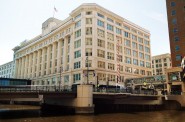 Feb 25th, 2024 by Jeramey Jannene
Feb 25th, 2024 by Jeramey Jannene
-
A Four-Way Preservation Fight Over Wisconsin Avenue
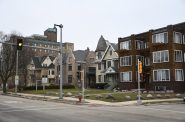 Feb 18th, 2024 by Jeramey Jannene
Feb 18th, 2024 by Jeramey Jannene


